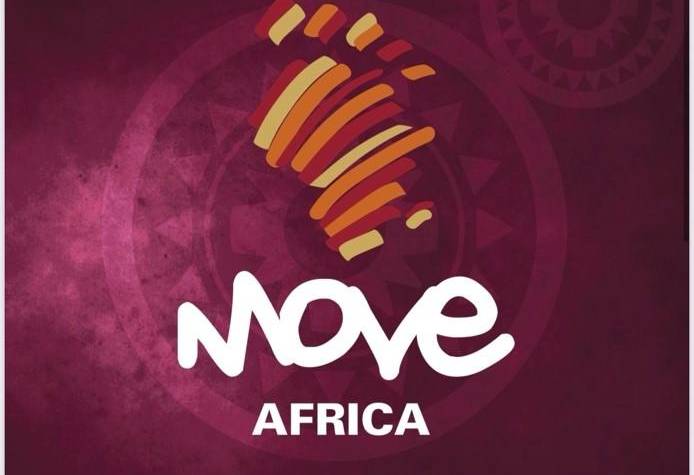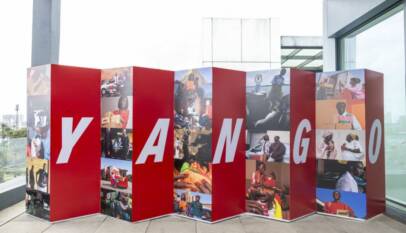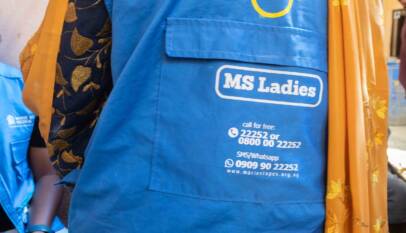3rd Move Africa Session Spotlights Joint Labour Migration Programme (JLMP)
The Move Africa Spotlight Sessions facilitate knowledge sharing, promoting balanced and human-centered perspectives on migration, while the Joint Labour Migration Programme (JLMP) facilitates intra-African mobility as a crucial means of advancing regional integration and development in Africa.

International migrant stock data (2020) shows around 21 million Africans live in another African country, a significant increase from 2015, when around 18 million Africans were estimated to be living outside of their country of origin but within their native region. Likewise, over 40 million international migrants call Africa home. Given this, free and safe movement of people within Africa could have a transformative effect on continental unity and economic growth.
In light of this, the AU’s Move Africa Communication project seeks to shift public perception of intra-African migration by emphasizing the benefits, challenges, and opportunities associated with intra-African migration. Move Africa champions narratives that promote free and safe intra-African movement as a cornerstone of the African Union’s Agenda 2063. By fostering positive migration narratives, Move Africa seeks to unlock the social, economic, and cultural benefits of seamless mobility for Africans in Africa.
The project, which is aimed at fostering a more nuanced and positive understanding of migration, labor mobility and free movement in Africa, is spearheaded by the AU’s Information and Communication Department (AU ICD), with technical and financial support from Deutsche Gesellschaft fuer Internationale Zusammenarbeit (GIZ) GmbH i.e. the German Development Corporation and the AU Department of Health, Humanitarian Affairs and Social Development (AU HHS).
To this end, the Move Africa Spotlight Sessions facilitate knowledge sharing and collaboration as well as promote balanced and human-centered perspectives on migration while advocating for policies that foster safe and regular mobility across the continent. Against this backdrop, the third Spotlight Session focused on AU’s labour migration policies, particularly the Joint Labour Migration Programme, and its linkages with the AU Free Movement Protocol (AU-FMP) and the African Continental Free Trade Area (AfCFTA).
JLMP and Seamless Intra-African Migration
The AU views seamless intra-African mobility as ameans to achieve its Agenda 2063’s goals of poverty eradication, job creation, and inclusive growth. Hence, fostering intra-African labour migration is at the heart of AU’s Free Movement Protocol (FMP), the Migration Policy Framework for Africa (MPFA), and its Plan of Action (2018-2030). The AfCFTA also seeks to create a borderless Africa where goods, services, and people can move freely.
To this end, the Joint Labour Migration Programme (JLMP) facilitates intra-continental mobility of workers as a crucial means of advancing regional integration and development in Africa. The JLMP, whose implementing partners include the African Union Commission (AUC), the International Organization for Migration (IOM), International Labour Organization (ILO) and GIZ, was adopted in 2015. Its mandate is drawn from the AU’s Declaration and Plan of Action on Employment, Poverty Eradication & Inclusive Development.
Seamless movement facilitates the exchange of goods, services, and skills, thereby boosting Africa’s competitiveness in global affairs. For instance, data has shown intra-African exports to have risen to 16% of total trade due to improved infrastructure like roads and rail. Likewise, labor migration, supported by initiatives like the JLMP, is strategically positioned to drive economic development by addressing skill shortages and promoting fair recruitment practices.
The AU views free movement as a response to historical colonial borders, which separated communities and reinforced barriers to mobility. Thus, easing travel restrictions will allow Africans the opportunity to travel across their continent and explore cultural differences and social norms. Currently, Africans need visas to enter 55% of other African countries. One of the AU’s responses to this challenge is the African Passport, a flagship project of Agenda 2063 that not only seeks to boost tourism but also rebuild the sense of shared heritage among Africans.
Brian Okengo, a statistician at the Joint Labour Migration Programme (JLMP) who spoke at the 3rd Move Africa Spotlight Session says the Programme which is currently at the end of its second phase is based on key pillars such as labour migration governance, social protection, securing decent work and skills recognition for migrant workers, as well as supporting AU Member States to collect accurate labour migration statistics to support policy development.
“We supported Cameroon and the East African Community (EAC) to develop their national labour migration policies. We are also supporting Malawi and the Economic Community of West African States (ECOWAS) to develop their labour migration policy. And because African migrant workers are increasingly moving to the Gulf countries, we in 2024 launched the Doha Dialogue in collaboration with the Gulf Cooperation Council (GCC), to improve the conditions of African migrants living and working in the GCC countries,” Okengo said.
“Movement of people is a developmental strategy” —AUC Adviser
Another speaker at the session, Dr. Oluwafemi Olamuyiwa, Advisor on Free movement of Persons at the AU Commission, noted that security concerns in some of the Member States are among the challenges hampering the implementation of the AU’s vision for a borderless continent. Nigeria, for instance, is confronted by multiple security challenges, notably the Boko Haram insurgency in the northeast, the herder-farmers conflict in the northcentral, and the banditry disturbances in the northwest.
“Economic disparities mean wealthier Member States are afraid of migrants from less developed economies, because they think migrants drain their resources. Weak technical support also limits the issuance of the African Passport, and many countries lack policies to protect migrant rights, such as social security portability. To achieve ‘The Africa We Want’, Member States must work together to address the security challenges through regional cooperation and strengthened border management systems,” said the AUC’s free movement adviser.
Dr Olumuyiwa said to prevent migration imbalances, wealthier African nations should support regional economic development through initiatives like the AfCFTA to ensure economic benefits are evenly shared across the continent, adding that free movement offers an immense potential for multidimensional growth in Africa.
“If you talk about AfCFTA, it’s people that will move the goods, if you talk about Single African Air Transport Market (SAATM), it is still people that fly in the planes. As such, the AU Free Movement Protocol holds a great promise for economic, social, and political development in Africa. By addressing free movement challenges and implementing the recommended measures, the continent can realise its full potential and move closer to the vision of Agenda 2063,” Dr. Olamuyiwa remarked.
The Move Africa Spotlight Sessions aim to foster dialogue between migration and media stakeholders across the continent, promoting a more balanced and informed understanding of migration and the free movement of people. Through the strategic implementation of recommended measures, Africa can address key challenges and unlock the full potential of seamless mobility, trade, and continental unity, bringing the continent closer to its vision of a prosperous, integrated Africa as enshrined in the Agenda 2063.













